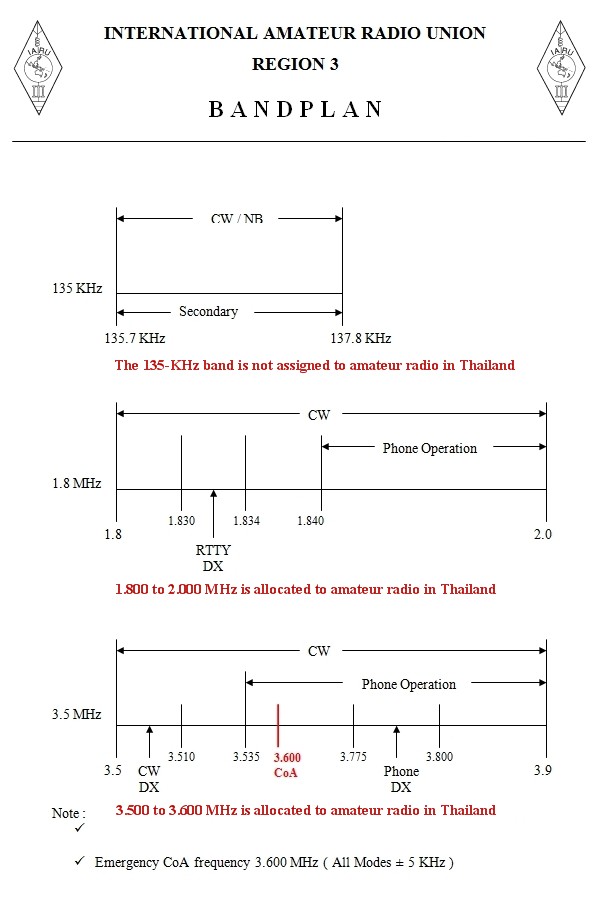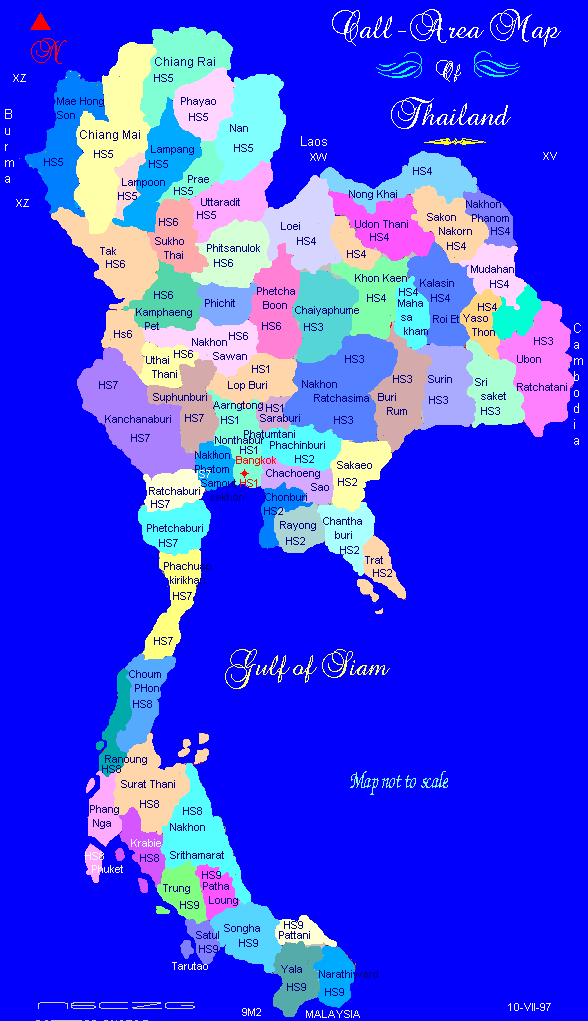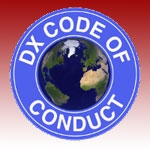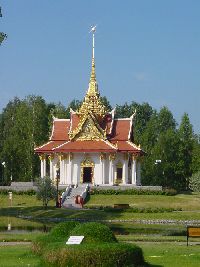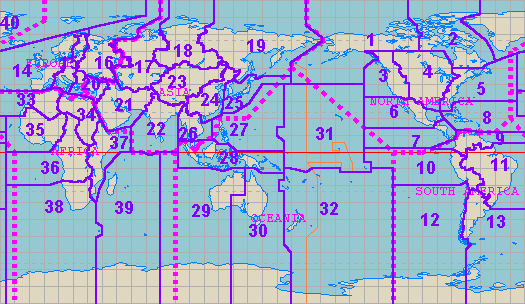Amateur radio licensing in Thailand
The Radio Amateur Society of Thailand (RAST) has been receiving a large number of detailed queries about reciprocal licensing. RAST is a decentralised organisation that does not have an office and all officers of the society are unpaid volunteers so we ask that you please read the requirements below closely before submitting any documents or making any requests.
The licensing authority
The agency responsibnle for supervising amateur radio licensing and operations in Thailand is the secretariat of the National Broadcasting and Telecommunications Commission (NBTC) [formerly the National Telecommunications Commission (NTC) and prior to that, the Post and Telegraph Department], located at offices on Soi Sailom (Phaholyothin Soi 8). Thailand is a sovereign country and has a unique and detailed licensing system enshrined in the laws of the Royal Thai Government.
Thailand is a member of the International Telecommunications Union and seeks bilateral diplomatic agreements with individual countries that are prepared to make bilateral reciprocal arrangements for their citizens to operate amateur radio.
Thailand now has bilateral reciprocal agreements with ten countries (see below) that have enabled their nationals who are licensed amateur radio operators and who are residents or who have a visa that enables long-term stay in the Kingdom to obtain a reciprocal amateur radio licence here.
Some statistics about amateur radio in Thailand
Until recently, callsigns were issued based on the location of the operator (Area 0 and 1 being Bangkok and the surrounding provinces, 2 being the eastern seaboard and area 3 being the lower Northeast, etc.) but this no longer applies since callsigns in some series have been exhausted.
The most recent callsigns issued as of July 2, 2012 are as follows:
call area 1 E23PIJ
call area 2 E27HXQ
call area 3 HS3YVE
call area 4 HS4YRT
call area 5 E22ZXC
call area 6 E23IEG
call area 7 E29FIX
call area 8 E24AGF
call area 9 E23BVQ
(Source: NBTC report, May 4, 2012 - thanks to Champ, E21EIC for this information).
Radio Amateur Society of Thailand
Under the Royal Patronage of His Majesty the King
Monthly Meetings
Details of upcoming RAST meetings can be found on the RAST English-language website.
Licence Processing
Please note that RAST is an entirely voluntary organisation, with no paid staff. Therefore RAST cannot undertake to process individual licences or permits for members beyond giving advice and providing supporting documentation.
The RAST Club Station HS0AC
The RAST Club Station is HS0AC at the Asian Institute of Technology (AIT). This is about a 20-minute drive north of Bangkok's Don Muang Airport and 42 kilometres from downtown Bangkok. Following severe flooding during October and November 2011 the station had been inundated to a depth of two metres and much of its equipment had been destroyed.
However, the station has been completely rebuilt and restocked with equipment and is back in operations and regularly participates in international amateur radio contests while providing facilties where guest operators visiting Thailand may operate from.
Amateur radio licensing
Reciprocal, with own licence and callsign, or by using the RAST club station HS0AC and operating with a guest permit.
These are described in detail below.
For those qualifying, a reciprocal operator's licence may be issued as either:
Intermediate class: For HF (160. 80, 40, 30, 20, 18, 15, 12 and 10 metres) and VHF bands, which is 2 metres (144-146 MHz) and receive only on 430 MHz, or
Novice class: VHF (144-146 MHz) and receive only on 430 MHz.
In addition to the operator's licence, you will need an equipment licence for each transceiver and a station licence if you want to operate from home or your rented accommodation. These three licences are described in more detail below.
Reciprocal licences
Austria
Belgium
Denmark
Finland
France
Germany
Luxembourg (here is info for Thais to get a LX call)
Sweden
Switzerland
United Kingdom
USA
If you are a citizen of one of these countries and a licensed amateur and you are planning to retire or will be living and working in Thailand, or if your business brings you here regularly, you can apply for a reciprocal operating licence to obtain equivalent privileges with a Thai licence and callsign, depending on the particular agreement. A reciprocal licensee is normally issued with a callsign in the series HS0Zxx and the licence lasts for five years and is renewable.
You should join RAST
General Procedure
It is important that your visa is valid for at least three months and that you allow for at least three weeks' processing time for the licence to be issued before your period of operation. If you are planning to import equipment and operate from your own location further permits are needed and this may take up to three months. The operating licence fee is 200 baht (plus stamp duty) (approx 7 USD), with similar charges for renewals.
Thai Proxy
RAST can check your documents
RAST guest permit
Bringing equipment to Thailand
The operator's licence
How to apply for a Thai reciprocal licence
Decide if you can do it! Decide if you are eligible for a reciprocal licence by reading this document carefully.
Obtain the application forms
Obtain the application forms in person from the NBTC's Amateur Radio Licensing Department,
Complete the application forms
Normally RAST can supply the following forms as a set:
A list of documents required
An application form in the English Language
An application form in Thai
A proxy form to appoint a Thai citizen to process the licence on your behalf.
You can also view (and you can save a copy if you wish) the following documents here:
Reciprocal licence application form (English)
Reciprocal licence application form (Thai)
Proxy form for reciprocal licence application
Collection of links to these documents and advice about "to get reciprocal callsign"
(each link opens in a new browser window)
Send your completed forms to [email protected]
They will be checked and screened because you will need a supporting letter from RAST. If you are already a RAST member this speeds the process up since several members will probably already know you. Otherwise there could be a short delay while you are "screened" because RAST must verify your credentials and determine that you are a responsible person.
It also helps if you can advise the RAST Secretary of your intended date to submit documents and apply for a supporting letter, so that preparations can be made before your attendance at a RAST meeting.
After checking and screening by RAST these documents will be returned to you.
You should bring your completed forms and supporting documentation to one of the RAST meetings that are usually held from 11 a.m. onwards at Sena Place Hotel on the first Sunday of each month (the address is on the home page of this website) and register your application
Registration with RAST and to be a life member of RAST is a government requirement for a Thai operator's licence, and you will be given a copy of the registration form to submit with your application. This service is given free of charge by RAST to its members.
Obtain your Supporting Letter
If your documents are all in order, RAST will be able to issue you a formal supporting letter to accompany your application.
You should join RAST
VIP Gold Life membership in RAST is required for foreigners in order to obtain or hold a reciprocal Thai amateur radio operating licence. VIP Gold Life membership costs 5,000 baht (US$143).
Please bring your prepared documents
The following documents are required for your reciprocal operating licence application:
A photocopy of your passport information page and the page(s) also showing your visa and arrival date stamp.
(Visa details: You are applying for a five-year licence therefore it is expected that you will be working, living, or regularly visiting Thailand over an extended period. For your initial visit on which you apply for a licence you should have at least a 90-day visa obtained in advance outside Thailand. A 30-day, visa on arrival is not regarded as acceptable as a basis for obtaining this licence.)
A photocopy of your home operator's licence.
Four standard passport photos sized 1'' x 1''
Your RAST membership number or completed application form
A letter of support from RAST (free of charge to members).
A completed NBTC application form for the licence
A certified document stating your reason to be in Thailand
-- If you are resident in Thailand on the grounds of marriage, please bring a copy of your marriage registration certificate, and a copy of any name change certificate if this applies.
-- If you are applying on grounds of working in Thailand you should provide a copy of your work permit and/or a letter from your employer certifying that you are required to work in Thailand on a regular basis.
-- If you are retiring or are retired in Thailand you should be prepared to show immigration documents or other evidence of this.
-- If you will be regularly visiting or staying in Thailand for any other reason, you will need to provide substantive evidence in the form of a letter of certification from a professional person or organisation
RAST ADVICE: You should provide if possible a simple single document certifying your status in Thailand.
The sum of 200 baht (plus stamp duty) for the licence.
Take your documents to the NBTC secretariat
Take all of your documents in person to the Amateur Radio Licensing Section of the NBTC, and submit them. If your application is in order they will normally ask you to collect the licence from their office within a few days.
The equipment licence
The next stage would be to request a licence to import transmitting equipment or to purchase a registered transceiver in Thailand from another amateur, or to purchase VHF equipment from a shop in Thailand. Please note that very little HF equipment is available from retail outlets here. Then a licence to use the equipment is required. This requires submission of the transceiver for testing and inspection by the NBTC's staff, accompanied by Customs clearance documentation, if it is imported. This needs to be done immediately after the equipment has been legally brought into the country.
Type-approval is important
If importing a transceiver yourself, it should be already on the list of equipment approved by NBTC (to see the list of HF transceivers click here).
A wider range of VHF equipment is also approved, and such a list for VHF rigs would be too unwieldy to maintain, however you should bear in mind that the legal power output on two metres is 10 watts. VHF transceivers are widely stocked in Thai amateur radio shops and prices are reasonable. The shopkeeper will usually process the equipment licence for you as part of the purchase as long as you have your operator's licence.
The legal power output limit for HF is 200 watts. Even if the transceiver you wish to import is on the type-approved list, it has to be submitted to the NBTC along with the manufacturer's specification, appropriate Customs processing documentation and the importation documentation. The equipment is then checked against the specification.
You need to identify the make and model
An import licence can be requested from the NBTC after your operating licence has been issued but only after you have identified the make and model of transceiver that you desire to import.
This requires an application form to be filled in, to be submitted with details of the proposed transceiver, which is to be imported with a detailed specification in the English language, diagrams, operating and a servicing handbook if possible. The rig can then be imported, and processed through the Customs Department then taken to NBTC where it will be inspected and tested. If approved, a registration label will be attached to the transceiver and a "licence to use" (equipment licence) will be issued.
It will facilitate the process of importing a transceiver if its frequency coverage complies with frequency bands allocated in Thailand. For HF these currently are 160, 80, 40, 30, 20, 18, 15, 12 and 10 metre-bands.
Note: There is an involved (and expensive) procedure in getting any transceiver added to the type-approved list. It is not possible to obtain a licence for a transceiver that operates on bands not approved by the NBTC with, as of early 2012, the exception of radios with six metres capability.
The NBTC is now approving the import of such transceivers but please note that if the radio you intend to import is not on the type-approved list then you will probably be subject to a first-time type-approval surcharge of 27,000 baht.
The station licence
You will need to take a copy of your operator's licence and your equipment licence (for use of the registered transceiver) to the NBTC on Phaholyothin Soi 8 (Soi Sailom) along with written permission from the owner of the accommodation or property where the amateur radio station will be, stating that operation and an antenna is permitted on the premises. (If possible this should be in both Thai and English).
This application should include a copy of the identity card of the owner of the accommodation, a copy of the house registration certificate of the owner of the house. You also need to provide the address and a detailed map of the location.
Guest operation of HS0AC
The Radio Amateur Society of Thailand (RAST) holds a concession from the NBTC to allow suitably qualified foreign guests to operate the HS0AC RAST Club Station which is located on the campus of the Asian Institute of Technology (AIT). The guest should be a paid-up member of RAST and a licensed amateur radio operator in his or her home country but does not need to possess a Thai operator's licence to enjoy this privilege. The purpose of the concession to RAST is to provide an opportunity for short-term visitors (including guests of RAST or visiting amateurs here on Royal Thai Government business) to operate the club station on an occasional basis to share the experience of amateur radio operation from a DX location.
Foreign amateurs have donated most of the equipment at the station, since HF equipment is not readily available in Thailand. The price of equipment that is available are relatively high and beyond the financial means of many Thai amateurs. Since the running and repair costs are a significant burden for RAST, we ask that our guests take good care of the equipment and furniture at HS0AC.
Donations are most welcome
Please note that all donations are most welcome and RAST is very grateful to all the visitors and members who have supported the HS0AC club station over many years with donations of both money and equipment that ensures that the society will be able to continue to afford the rent and the upkeep of the station.
Guest operators must use the callsign HS0AC, but may mention "operated by own callsign" or use "HS0AC/own callsign". QSLs for HS0AC can be received or sent via the Thailand QSL bureau or via the QSL Manager E21EIC (Champ). Please don't mention any other QSL arrangements or it may cause confusion. RAST will manage incoming QSL requirements for contacts made by guest operators.
A computer log is preferred. If a paper log is used, the guest operator must arrange to get the details of the QSOs made entered into a computer text file (ASCII) within a reasonable time. An appropriate contribution to QSL costs would be appreciated.
Guests are requested to communicate on the air mainly in English or in the Thai Language, particularly when giving callsigns. If another language is used, operators are asked to please ensure that they begin and end each transmission with the HS0AC callsign in the English Language. This is to facilitate the monitoring of operations by the NBTC and RAST.
Addresses and contact information
RAST President and RAST postal address The President of RAST is Jakkree Hantongkom (HS1FVL - Jack)
Email address: hs1fvl(AT)gmail.com
Address for enquiries about RAST or amateur radio in Thailand: [email protected] Address for Correspondence
RAST
G.P.O. Box 2008
Bangkok
10501
Thailand
National Broadcasting and Telecommunications Commission (NBTC) Secretariat
Amateur Radio Licensing Department
National Broadcasting and Telecommunications Commission Secretariat
Soi Sailom (Soi 8),
Phaholyothin Road,
Bangkok
Telephone Number 02 278 0151 (General Inquiries)
The licensing Section is in a building to the right of the main entrance.
Updated August, 2016





